MGT5EBP (Semester 2): Individual Report on Global Entrepreneurship
VerifiedAdded on 2022/10/11
|13
|2928
|16
Report
AI Summary
This report provides a comprehensive analysis of global entrepreneurship, focusing on the challenges faced by entrepreneurs operating across international borders. It identifies key issues such as geographical distance, contextual differences, and resource limitations. The report also explores strategic recommendations, including the importance of establishing clear goals, forming strategic alliances, and implementing effective supply chain and value chain management. By examining the evolution of global entrepreneurship and its theoretical foundations, the report offers insights into how entrepreneurs can navigate the complexities of the global market and mitigate potential risks. The report utilizes various theories and real-world examples to illustrate the challenges and potential solutions, providing a detailed overview of the topic for students studying entrepreneurship.
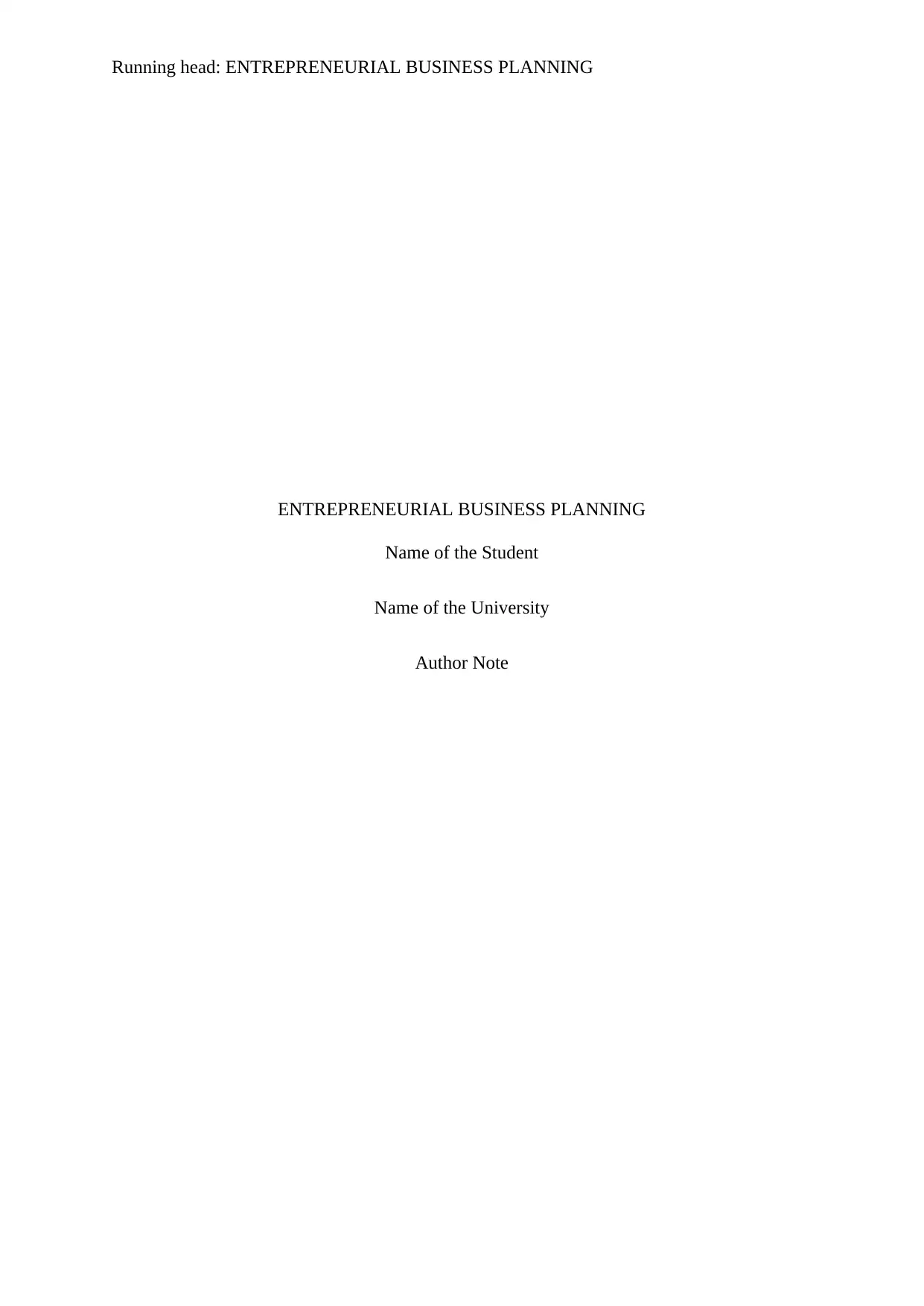
Running head: ENTREPRENEURIAL BUSINESS PLANNING
ENTREPRENEURIAL BUSINESS PLANNING
Name of the Student
Name of the University
Author Note
ENTREPRENEURIAL BUSINESS PLANNING
Name of the Student
Name of the University
Author Note
Paraphrase This Document
Need a fresh take? Get an instant paraphrase of this document with our AI Paraphraser
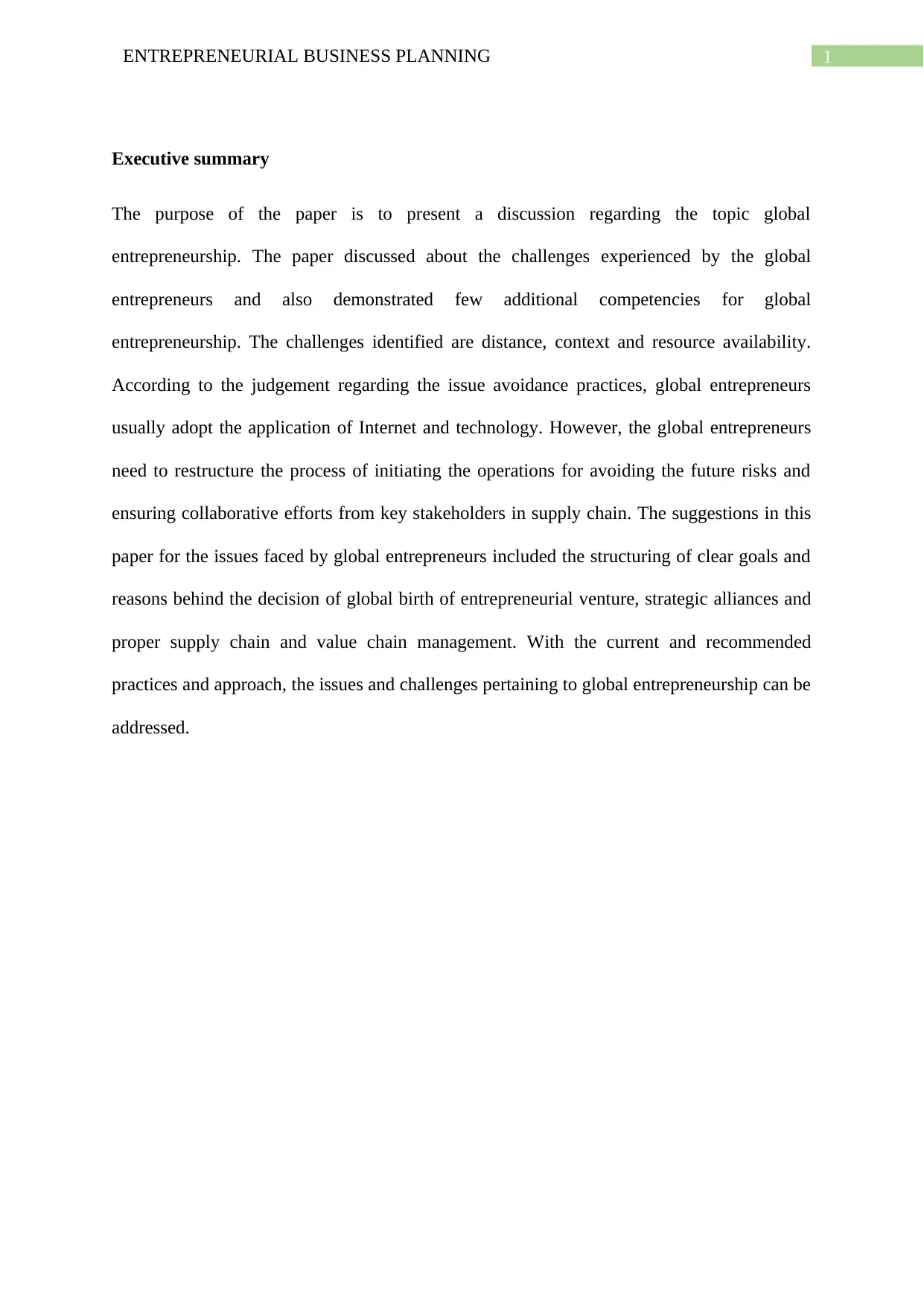
1ENTREPRENEURIAL BUSINESS PLANNING
Executive summary
The purpose of the paper is to present a discussion regarding the topic global
entrepreneurship. The paper discussed about the challenges experienced by the global
entrepreneurs and also demonstrated few additional competencies for global
entrepreneurship. The challenges identified are distance, context and resource availability.
According to the judgement regarding the issue avoidance practices, global entrepreneurs
usually adopt the application of Internet and technology. However, the global entrepreneurs
need to restructure the process of initiating the operations for avoiding the future risks and
ensuring collaborative efforts from key stakeholders in supply chain. The suggestions in this
paper for the issues faced by global entrepreneurs included the structuring of clear goals and
reasons behind the decision of global birth of entrepreneurial venture, strategic alliances and
proper supply chain and value chain management. With the current and recommended
practices and approach, the issues and challenges pertaining to global entrepreneurship can be
addressed.
Executive summary
The purpose of the paper is to present a discussion regarding the topic global
entrepreneurship. The paper discussed about the challenges experienced by the global
entrepreneurs and also demonstrated few additional competencies for global
entrepreneurship. The challenges identified are distance, context and resource availability.
According to the judgement regarding the issue avoidance practices, global entrepreneurs
usually adopt the application of Internet and technology. However, the global entrepreneurs
need to restructure the process of initiating the operations for avoiding the future risks and
ensuring collaborative efforts from key stakeholders in supply chain. The suggestions in this
paper for the issues faced by global entrepreneurs included the structuring of clear goals and
reasons behind the decision of global birth of entrepreneurial venture, strategic alliances and
proper supply chain and value chain management. With the current and recommended
practices and approach, the issues and challenges pertaining to global entrepreneurship can be
addressed.

2ENTREPRENEURIAL BUSINESS PLANNING
Table of Contents
Introduction................................................................................................................................2
Discussion..................................................................................................................................2
Challenges..............................................................................................................................5
Recommendations:.................................................................................................................7
Conclusion..................................................................................................................................8
Table of Contents
Introduction................................................................................................................................2
Discussion..................................................................................................................................2
Challenges..............................................................................................................................5
Recommendations:.................................................................................................................7
Conclusion..................................................................................................................................8
⊘ This is a preview!⊘
Do you want full access?
Subscribe today to unlock all pages.

Trusted by 1+ million students worldwide
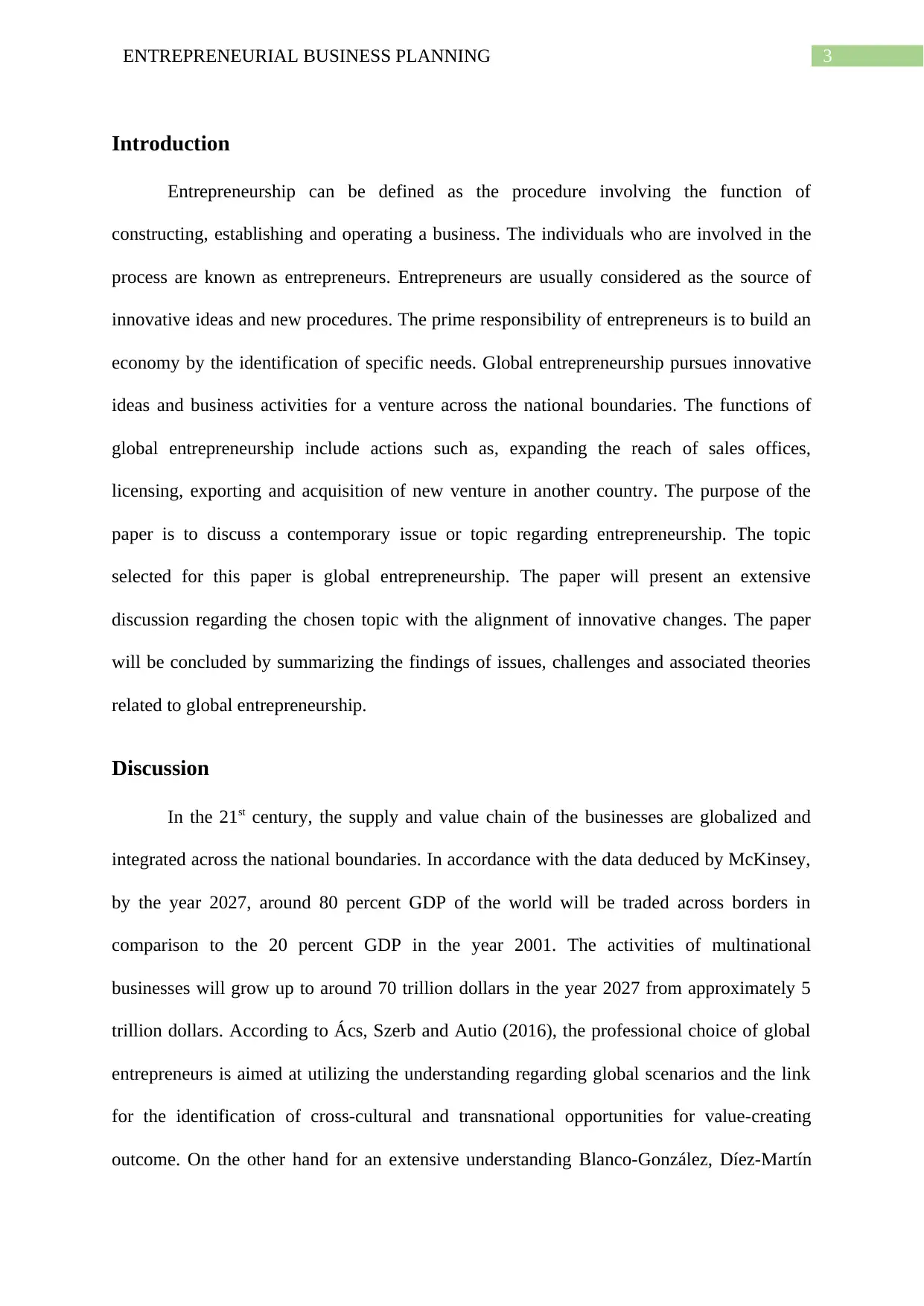
3ENTREPRENEURIAL BUSINESS PLANNING
Introduction
Entrepreneurship can be defined as the procedure involving the function of
constructing, establishing and operating a business. The individuals who are involved in the
process are known as entrepreneurs. Entrepreneurs are usually considered as the source of
innovative ideas and new procedures. The prime responsibility of entrepreneurs is to build an
economy by the identification of specific needs. Global entrepreneurship pursues innovative
ideas and business activities for a venture across the national boundaries. The functions of
global entrepreneurship include actions such as, expanding the reach of sales offices,
licensing, exporting and acquisition of new venture in another country. The purpose of the
paper is to discuss a contemporary issue or topic regarding entrepreneurship. The topic
selected for this paper is global entrepreneurship. The paper will present an extensive
discussion regarding the chosen topic with the alignment of innovative changes. The paper
will be concluded by summarizing the findings of issues, challenges and associated theories
related to global entrepreneurship.
Discussion
In the 21st century, the supply and value chain of the businesses are globalized and
integrated across the national boundaries. In accordance with the data deduced by McKinsey,
by the year 2027, around 80 percent GDP of the world will be traded across borders in
comparison to the 20 percent GDP in the year 2001. The activities of multinational
businesses will grow up to around 70 trillion dollars in the year 2027 from approximately 5
trillion dollars. According to Ács, Szerb and Autio (2016), the professional choice of global
entrepreneurs is aimed at utilizing the understanding regarding global scenarios and the link
for the identification of cross-cultural and transnational opportunities for value-creating
outcome. On the other hand for an extensive understanding Blanco-González, Díez-Martín
Introduction
Entrepreneurship can be defined as the procedure involving the function of
constructing, establishing and operating a business. The individuals who are involved in the
process are known as entrepreneurs. Entrepreneurs are usually considered as the source of
innovative ideas and new procedures. The prime responsibility of entrepreneurs is to build an
economy by the identification of specific needs. Global entrepreneurship pursues innovative
ideas and business activities for a venture across the national boundaries. The functions of
global entrepreneurship include actions such as, expanding the reach of sales offices,
licensing, exporting and acquisition of new venture in another country. The purpose of the
paper is to discuss a contemporary issue or topic regarding entrepreneurship. The topic
selected for this paper is global entrepreneurship. The paper will present an extensive
discussion regarding the chosen topic with the alignment of innovative changes. The paper
will be concluded by summarizing the findings of issues, challenges and associated theories
related to global entrepreneurship.
Discussion
In the 21st century, the supply and value chain of the businesses are globalized and
integrated across the national boundaries. In accordance with the data deduced by McKinsey,
by the year 2027, around 80 percent GDP of the world will be traded across borders in
comparison to the 20 percent GDP in the year 2001. The activities of multinational
businesses will grow up to around 70 trillion dollars in the year 2027 from approximately 5
trillion dollars. According to Ács, Szerb and Autio (2016), the professional choice of global
entrepreneurs is aimed at utilizing the understanding regarding global scenarios and the link
for the identification of cross-cultural and transnational opportunities for value-creating
outcome. On the other hand for an extensive understanding Blanco-González, Díez-Martín
Paraphrase This Document
Need a fresh take? Get an instant paraphrase of this document with our AI Paraphraser
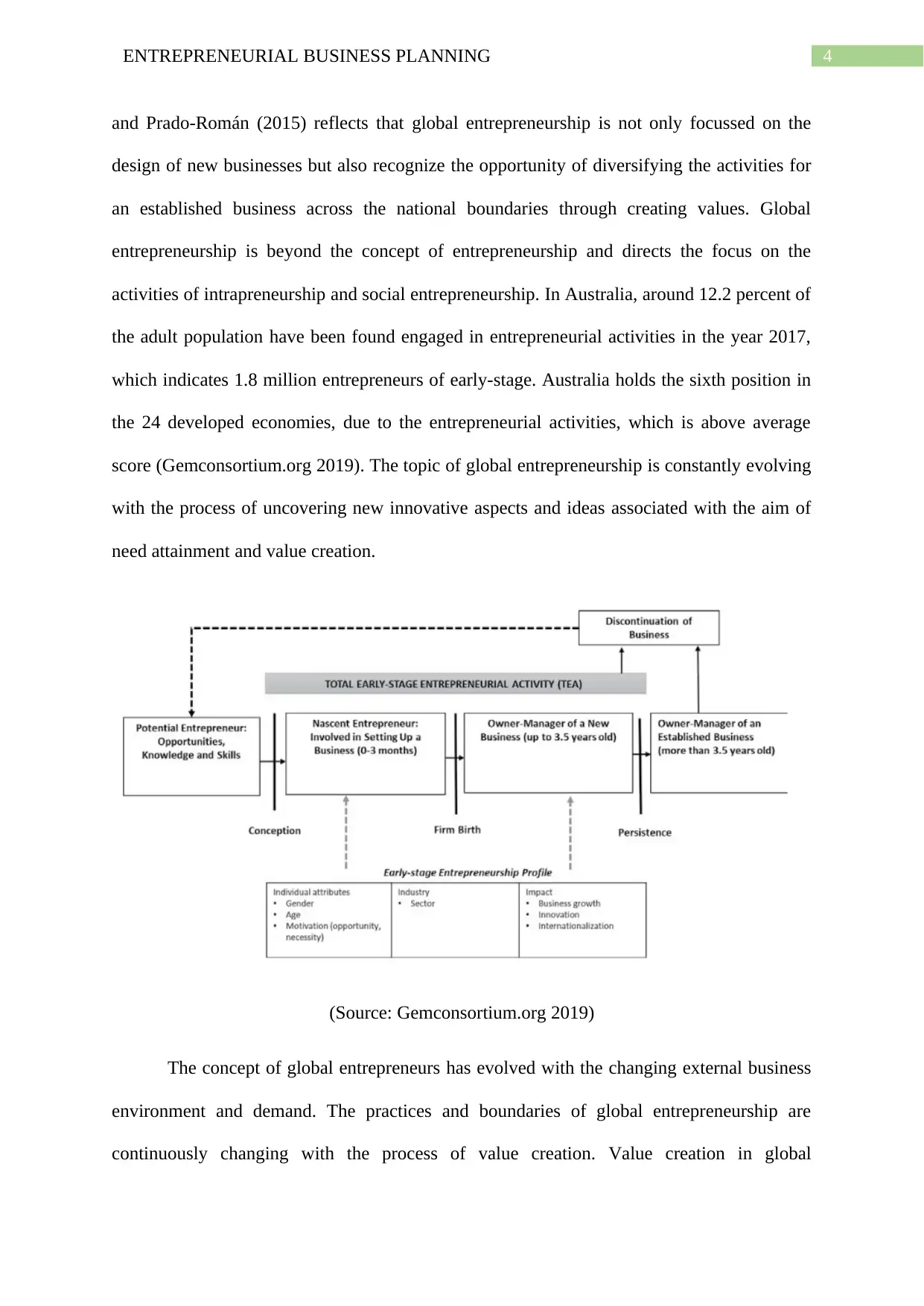
4ENTREPRENEURIAL BUSINESS PLANNING
and Prado-Román (2015) reflects that global entrepreneurship is not only focussed on the
design of new businesses but also recognize the opportunity of diversifying the activities for
an established business across the national boundaries through creating values. Global
entrepreneurship is beyond the concept of entrepreneurship and directs the focus on the
activities of intrapreneurship and social entrepreneurship. In Australia, around 12.2 percent of
the adult population have been found engaged in entrepreneurial activities in the year 2017,
which indicates 1.8 million entrepreneurs of early-stage. Australia holds the sixth position in
the 24 developed economies, due to the entrepreneurial activities, which is above average
score (Gemconsortium.org 2019). The topic of global entrepreneurship is constantly evolving
with the process of uncovering new innovative aspects and ideas associated with the aim of
need attainment and value creation.
(Source: Gemconsortium.org 2019)
The concept of global entrepreneurs has evolved with the changing external business
environment and demand. The practices and boundaries of global entrepreneurship are
continuously changing with the process of value creation. Value creation in global
and Prado-Román (2015) reflects that global entrepreneurship is not only focussed on the
design of new businesses but also recognize the opportunity of diversifying the activities for
an established business across the national boundaries through creating values. Global
entrepreneurship is beyond the concept of entrepreneurship and directs the focus on the
activities of intrapreneurship and social entrepreneurship. In Australia, around 12.2 percent of
the adult population have been found engaged in entrepreneurial activities in the year 2017,
which indicates 1.8 million entrepreneurs of early-stage. Australia holds the sixth position in
the 24 developed economies, due to the entrepreneurial activities, which is above average
score (Gemconsortium.org 2019). The topic of global entrepreneurship is constantly evolving
with the process of uncovering new innovative aspects and ideas associated with the aim of
need attainment and value creation.
(Source: Gemconsortium.org 2019)
The concept of global entrepreneurs has evolved with the changing external business
environment and demand. The practices and boundaries of global entrepreneurship are
continuously changing with the process of value creation. Value creation in global
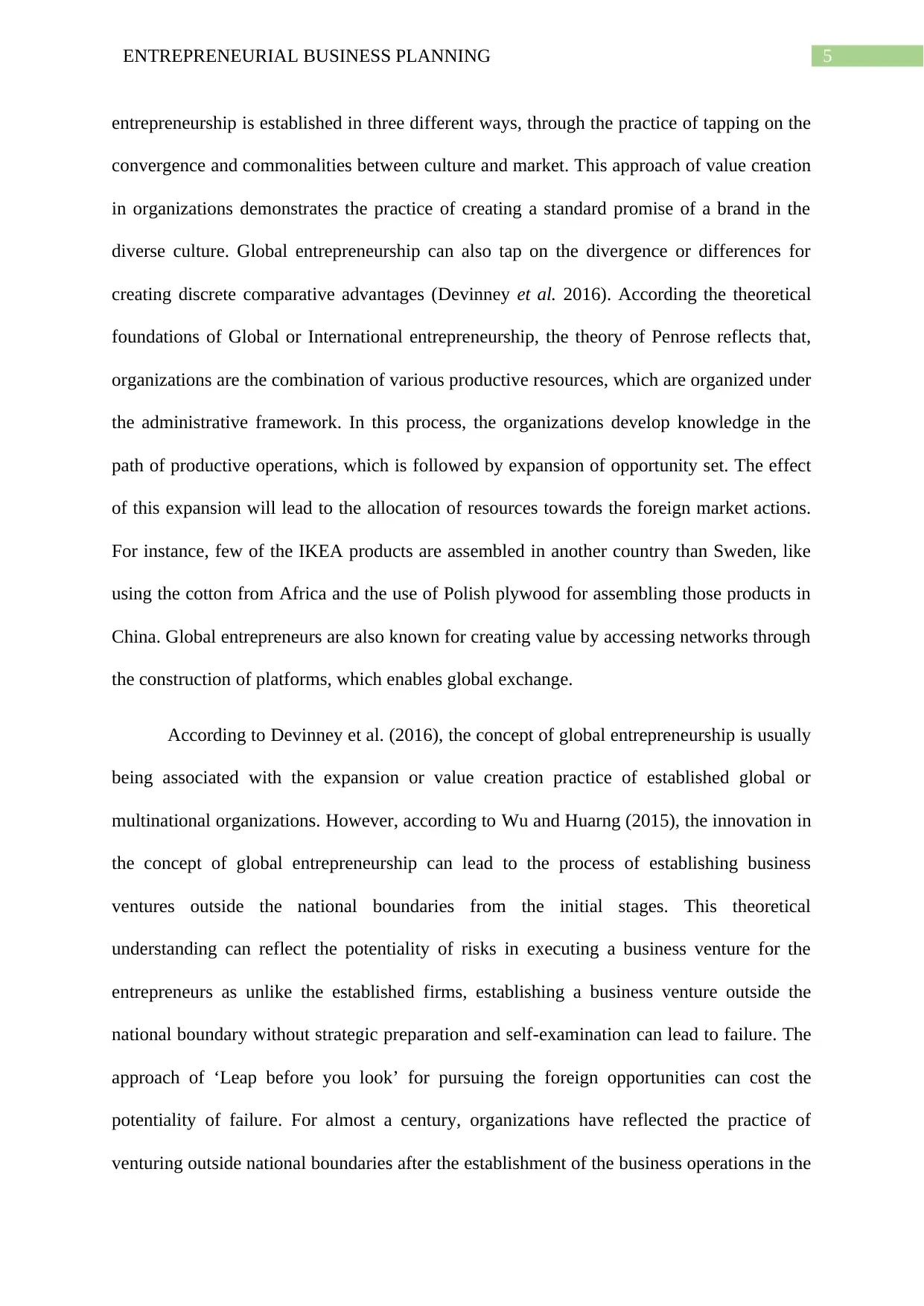
5ENTREPRENEURIAL BUSINESS PLANNING
entrepreneurship is established in three different ways, through the practice of tapping on the
convergence and commonalities between culture and market. This approach of value creation
in organizations demonstrates the practice of creating a standard promise of a brand in the
diverse culture. Global entrepreneurship can also tap on the divergence or differences for
creating discrete comparative advantages (Devinney et al. 2016). According the theoretical
foundations of Global or International entrepreneurship, the theory of Penrose reflects that,
organizations are the combination of various productive resources, which are organized under
the administrative framework. In this process, the organizations develop knowledge in the
path of productive operations, which is followed by expansion of opportunity set. The effect
of this expansion will lead to the allocation of resources towards the foreign market actions.
For instance, few of the IKEA products are assembled in another country than Sweden, like
using the cotton from Africa and the use of Polish plywood for assembling those products in
China. Global entrepreneurs are also known for creating value by accessing networks through
the construction of platforms, which enables global exchange.
According to Devinney et al. (2016), the concept of global entrepreneurship is usually
being associated with the expansion or value creation practice of established global or
multinational organizations. However, according to Wu and Huarng (2015), the innovation in
the concept of global entrepreneurship can lead to the process of establishing business
ventures outside the national boundaries from the initial stages. This theoretical
understanding can reflect the potentiality of risks in executing a business venture for the
entrepreneurs as unlike the established firms, establishing a business venture outside the
national boundary without strategic preparation and self-examination can lead to failure. The
approach of ‘Leap before you look’ for pursuing the foreign opportunities can cost the
potentiality of failure. For almost a century, organizations have reflected the practice of
venturing outside national boundaries after the establishment of the business operations in the
entrepreneurship is established in three different ways, through the practice of tapping on the
convergence and commonalities between culture and market. This approach of value creation
in organizations demonstrates the practice of creating a standard promise of a brand in the
diverse culture. Global entrepreneurship can also tap on the divergence or differences for
creating discrete comparative advantages (Devinney et al. 2016). According the theoretical
foundations of Global or International entrepreneurship, the theory of Penrose reflects that,
organizations are the combination of various productive resources, which are organized under
the administrative framework. In this process, the organizations develop knowledge in the
path of productive operations, which is followed by expansion of opportunity set. The effect
of this expansion will lead to the allocation of resources towards the foreign market actions.
For instance, few of the IKEA products are assembled in another country than Sweden, like
using the cotton from Africa and the use of Polish plywood for assembling those products in
China. Global entrepreneurs are also known for creating value by accessing networks through
the construction of platforms, which enables global exchange.
According to Devinney et al. (2016), the concept of global entrepreneurship is usually
being associated with the expansion or value creation practice of established global or
multinational organizations. However, according to Wu and Huarng (2015), the innovation in
the concept of global entrepreneurship can lead to the process of establishing business
ventures outside the national boundaries from the initial stages. This theoretical
understanding can reflect the potentiality of risks in executing a business venture for the
entrepreneurs as unlike the established firms, establishing a business venture outside the
national boundary without strategic preparation and self-examination can lead to failure. The
approach of ‘Leap before you look’ for pursuing the foreign opportunities can cost the
potentiality of failure. For almost a century, organizations have reflected the practice of
venturing outside national boundaries after the establishment of the business operations in the
⊘ This is a preview!⊘
Do you want full access?
Subscribe today to unlock all pages.

Trusted by 1+ million students worldwide
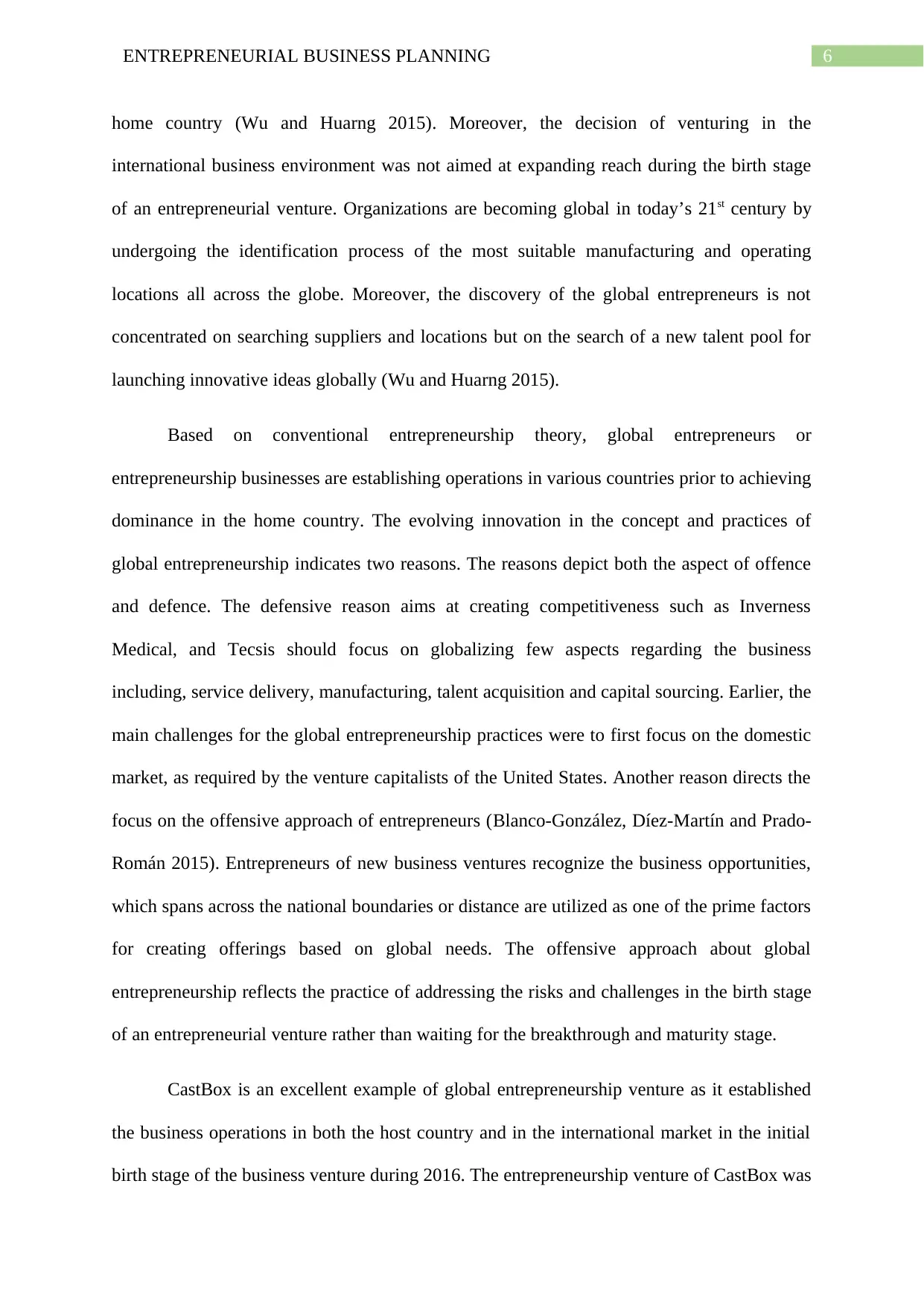
6ENTREPRENEURIAL BUSINESS PLANNING
home country (Wu and Huarng 2015). Moreover, the decision of venturing in the
international business environment was not aimed at expanding reach during the birth stage
of an entrepreneurial venture. Organizations are becoming global in today’s 21st century by
undergoing the identification process of the most suitable manufacturing and operating
locations all across the globe. Moreover, the discovery of the global entrepreneurs is not
concentrated on searching suppliers and locations but on the search of a new talent pool for
launching innovative ideas globally (Wu and Huarng 2015).
Based on conventional entrepreneurship theory, global entrepreneurs or
entrepreneurship businesses are establishing operations in various countries prior to achieving
dominance in the home country. The evolving innovation in the concept and practices of
global entrepreneurship indicates two reasons. The reasons depict both the aspect of offence
and defence. The defensive reason aims at creating competitiveness such as Inverness
Medical, and Tecsis should focus on globalizing few aspects regarding the business
including, service delivery, manufacturing, talent acquisition and capital sourcing. Earlier, the
main challenges for the global entrepreneurship practices were to first focus on the domestic
market, as required by the venture capitalists of the United States. Another reason directs the
focus on the offensive approach of entrepreneurs (Blanco-González, Díez-Martín and Prado-
Román 2015). Entrepreneurs of new business ventures recognize the business opportunities,
which spans across the national boundaries or distance are utilized as one of the prime factors
for creating offerings based on global needs. The offensive approach about global
entrepreneurship reflects the practice of addressing the risks and challenges in the birth stage
of an entrepreneurial venture rather than waiting for the breakthrough and maturity stage.
CastBox is an excellent example of global entrepreneurship venture as it established
the business operations in both the host country and in the international market in the initial
birth stage of the business venture during 2016. The entrepreneurship venture of CastBox was
home country (Wu and Huarng 2015). Moreover, the decision of venturing in the
international business environment was not aimed at expanding reach during the birth stage
of an entrepreneurial venture. Organizations are becoming global in today’s 21st century by
undergoing the identification process of the most suitable manufacturing and operating
locations all across the globe. Moreover, the discovery of the global entrepreneurs is not
concentrated on searching suppliers and locations but on the search of a new talent pool for
launching innovative ideas globally (Wu and Huarng 2015).
Based on conventional entrepreneurship theory, global entrepreneurs or
entrepreneurship businesses are establishing operations in various countries prior to achieving
dominance in the home country. The evolving innovation in the concept and practices of
global entrepreneurship indicates two reasons. The reasons depict both the aspect of offence
and defence. The defensive reason aims at creating competitiveness such as Inverness
Medical, and Tecsis should focus on globalizing few aspects regarding the business
including, service delivery, manufacturing, talent acquisition and capital sourcing. Earlier, the
main challenges for the global entrepreneurship practices were to first focus on the domestic
market, as required by the venture capitalists of the United States. Another reason directs the
focus on the offensive approach of entrepreneurs (Blanco-González, Díez-Martín and Prado-
Román 2015). Entrepreneurs of new business ventures recognize the business opportunities,
which spans across the national boundaries or distance are utilized as one of the prime factors
for creating offerings based on global needs. The offensive approach about global
entrepreneurship reflects the practice of addressing the risks and challenges in the birth stage
of an entrepreneurial venture rather than waiting for the breakthrough and maturity stage.
CastBox is an excellent example of global entrepreneurship venture as it established
the business operations in both the host country and in the international market in the initial
birth stage of the business venture during 2016. The entrepreneurship venture of CastBox was
Paraphrase This Document
Need a fresh take? Get an instant paraphrase of this document with our AI Paraphraser
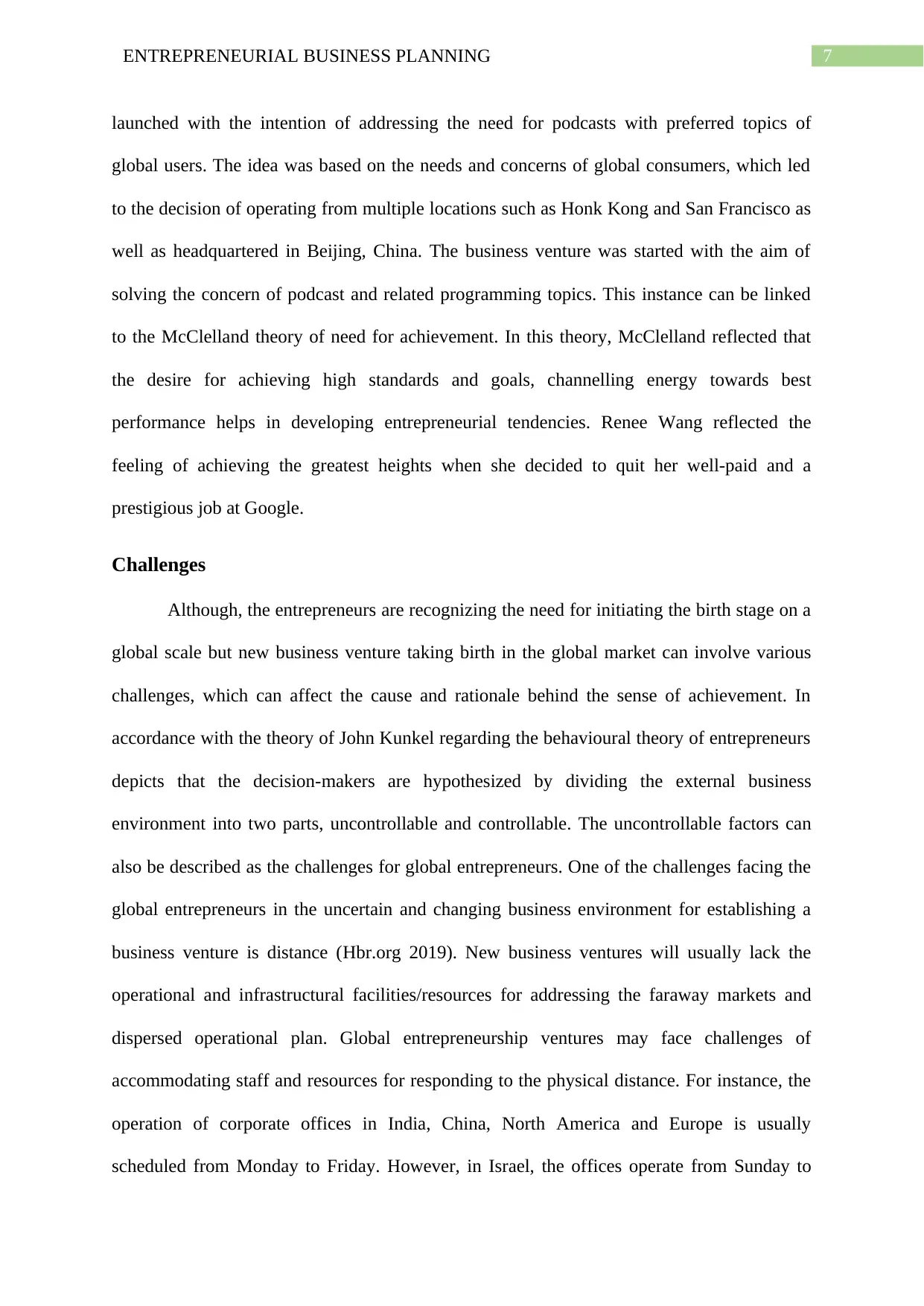
7ENTREPRENEURIAL BUSINESS PLANNING
launched with the intention of addressing the need for podcasts with preferred topics of
global users. The idea was based on the needs and concerns of global consumers, which led
to the decision of operating from multiple locations such as Honk Kong and San Francisco as
well as headquartered in Beijing, China. The business venture was started with the aim of
solving the concern of podcast and related programming topics. This instance can be linked
to the McClelland theory of need for achievement. In this theory, McClelland reflected that
the desire for achieving high standards and goals, channelling energy towards best
performance helps in developing entrepreneurial tendencies. Renee Wang reflected the
feeling of achieving the greatest heights when she decided to quit her well-paid and a
prestigious job at Google.
Challenges
Although, the entrepreneurs are recognizing the need for initiating the birth stage on a
global scale but new business venture taking birth in the global market can involve various
challenges, which can affect the cause and rationale behind the sense of achievement. In
accordance with the theory of John Kunkel regarding the behavioural theory of entrepreneurs
depicts that the decision-makers are hypothesized by dividing the external business
environment into two parts, uncontrollable and controllable. The uncontrollable factors can
also be described as the challenges for global entrepreneurs. One of the challenges facing the
global entrepreneurs in the uncertain and changing business environment for establishing a
business venture is distance (Hbr.org 2019). New business ventures will usually lack the
operational and infrastructural facilities/resources for addressing the faraway markets and
dispersed operational plan. Global entrepreneurship ventures may face challenges of
accommodating staff and resources for responding to the physical distance. For instance, the
operation of corporate offices in India, China, North America and Europe is usually
scheduled from Monday to Friday. However, in Israel, the offices operate from Sunday to
launched with the intention of addressing the need for podcasts with preferred topics of
global users. The idea was based on the needs and concerns of global consumers, which led
to the decision of operating from multiple locations such as Honk Kong and San Francisco as
well as headquartered in Beijing, China. The business venture was started with the aim of
solving the concern of podcast and related programming topics. This instance can be linked
to the McClelland theory of need for achievement. In this theory, McClelland reflected that
the desire for achieving high standards and goals, channelling energy towards best
performance helps in developing entrepreneurial tendencies. Renee Wang reflected the
feeling of achieving the greatest heights when she decided to quit her well-paid and a
prestigious job at Google.
Challenges
Although, the entrepreneurs are recognizing the need for initiating the birth stage on a
global scale but new business venture taking birth in the global market can involve various
challenges, which can affect the cause and rationale behind the sense of achievement. In
accordance with the theory of John Kunkel regarding the behavioural theory of entrepreneurs
depicts that the decision-makers are hypothesized by dividing the external business
environment into two parts, uncontrollable and controllable. The uncontrollable factors can
also be described as the challenges for global entrepreneurs. One of the challenges facing the
global entrepreneurs in the uncertain and changing business environment for establishing a
business venture is distance (Hbr.org 2019). New business ventures will usually lack the
operational and infrastructural facilities/resources for addressing the faraway markets and
dispersed operational plan. Global entrepreneurship ventures may face challenges of
accommodating staff and resources for responding to the physical distance. For instance, the
operation of corporate offices in India, China, North America and Europe is usually
scheduled from Monday to Friday. However, in Israel, the offices operate from Sunday to
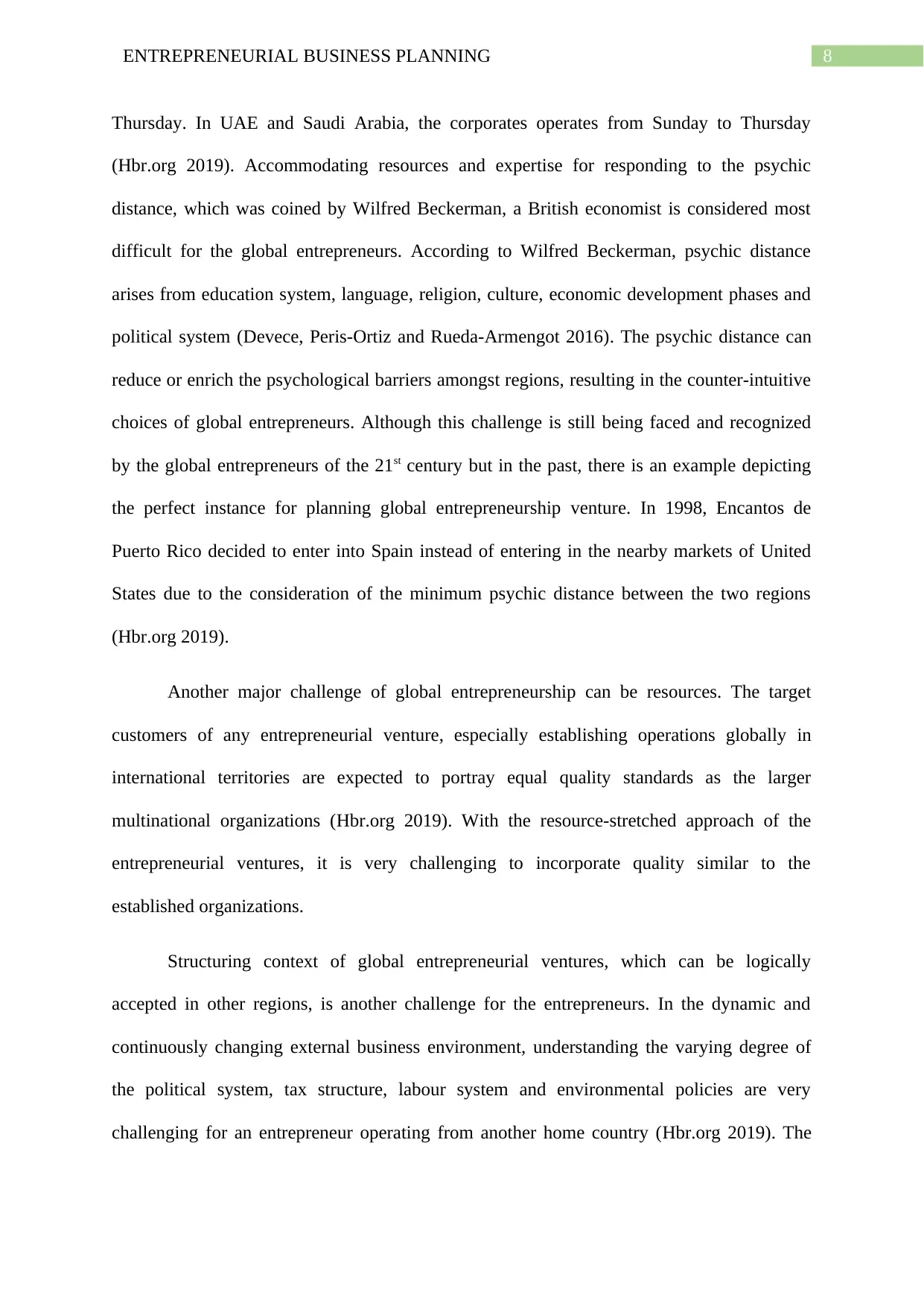
8ENTREPRENEURIAL BUSINESS PLANNING
Thursday. In UAE and Saudi Arabia, the corporates operates from Sunday to Thursday
(Hbr.org 2019). Accommodating resources and expertise for responding to the psychic
distance, which was coined by Wilfred Beckerman, a British economist is considered most
difficult for the global entrepreneurs. According to Wilfred Beckerman, psychic distance
arises from education system, language, religion, culture, economic development phases and
political system (Devece, Peris-Ortiz and Rueda-Armengot 2016). The psychic distance can
reduce or enrich the psychological barriers amongst regions, resulting in the counter-intuitive
choices of global entrepreneurs. Although this challenge is still being faced and recognized
by the global entrepreneurs of the 21st century but in the past, there is an example depicting
the perfect instance for planning global entrepreneurship venture. In 1998, Encantos de
Puerto Rico decided to enter into Spain instead of entering in the nearby markets of United
States due to the consideration of the minimum psychic distance between the two regions
(Hbr.org 2019).
Another major challenge of global entrepreneurship can be resources. The target
customers of any entrepreneurial venture, especially establishing operations globally in
international territories are expected to portray equal quality standards as the larger
multinational organizations (Hbr.org 2019). With the resource-stretched approach of the
entrepreneurial ventures, it is very challenging to incorporate quality similar to the
established organizations.
Structuring context of global entrepreneurial ventures, which can be logically
accepted in other regions, is another challenge for the entrepreneurs. In the dynamic and
continuously changing external business environment, understanding the varying degree of
the political system, tax structure, labour system and environmental policies are very
challenging for an entrepreneur operating from another home country (Hbr.org 2019). The
Thursday. In UAE and Saudi Arabia, the corporates operates from Sunday to Thursday
(Hbr.org 2019). Accommodating resources and expertise for responding to the psychic
distance, which was coined by Wilfred Beckerman, a British economist is considered most
difficult for the global entrepreneurs. According to Wilfred Beckerman, psychic distance
arises from education system, language, religion, culture, economic development phases and
political system (Devece, Peris-Ortiz and Rueda-Armengot 2016). The psychic distance can
reduce or enrich the psychological barriers amongst regions, resulting in the counter-intuitive
choices of global entrepreneurs. Although this challenge is still being faced and recognized
by the global entrepreneurs of the 21st century but in the past, there is an example depicting
the perfect instance for planning global entrepreneurship venture. In 1998, Encantos de
Puerto Rico decided to enter into Spain instead of entering in the nearby markets of United
States due to the consideration of the minimum psychic distance between the two regions
(Hbr.org 2019).
Another major challenge of global entrepreneurship can be resources. The target
customers of any entrepreneurial venture, especially establishing operations globally in
international territories are expected to portray equal quality standards as the larger
multinational organizations (Hbr.org 2019). With the resource-stretched approach of the
entrepreneurial ventures, it is very challenging to incorporate quality similar to the
established organizations.
Structuring context of global entrepreneurial ventures, which can be logically
accepted in other regions, is another challenge for the entrepreneurs. In the dynamic and
continuously changing external business environment, understanding the varying degree of
the political system, tax structure, labour system and environmental policies are very
challenging for an entrepreneur operating from another home country (Hbr.org 2019). The
⊘ This is a preview!⊘
Do you want full access?
Subscribe today to unlock all pages.

Trusted by 1+ million students worldwide
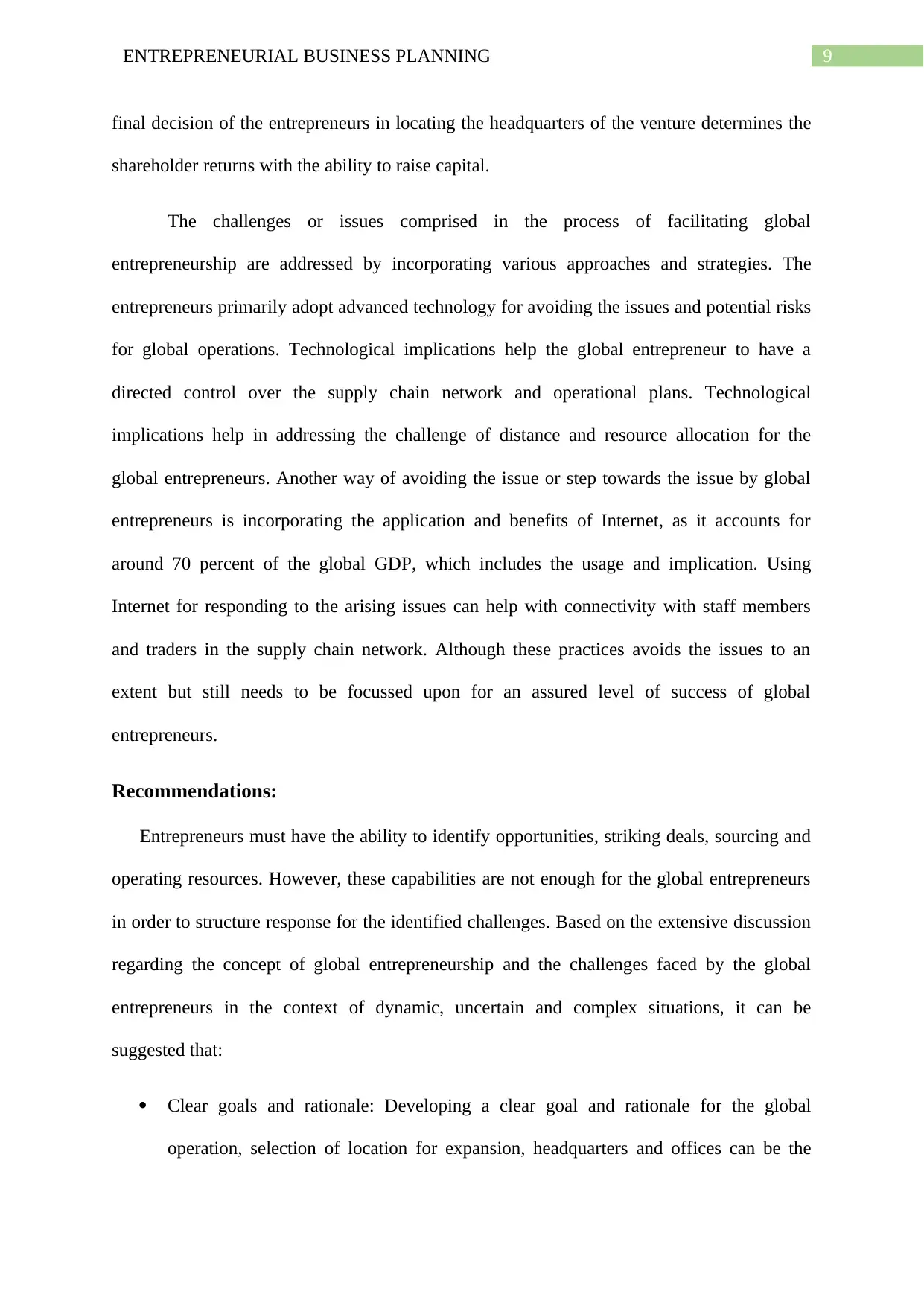
9ENTREPRENEURIAL BUSINESS PLANNING
final decision of the entrepreneurs in locating the headquarters of the venture determines the
shareholder returns with the ability to raise capital.
The challenges or issues comprised in the process of facilitating global
entrepreneurship are addressed by incorporating various approaches and strategies. The
entrepreneurs primarily adopt advanced technology for avoiding the issues and potential risks
for global operations. Technological implications help the global entrepreneur to have a
directed control over the supply chain network and operational plans. Technological
implications help in addressing the challenge of distance and resource allocation for the
global entrepreneurs. Another way of avoiding the issue or step towards the issue by global
entrepreneurs is incorporating the application and benefits of Internet, as it accounts for
around 70 percent of the global GDP, which includes the usage and implication. Using
Internet for responding to the arising issues can help with connectivity with staff members
and traders in the supply chain network. Although these practices avoids the issues to an
extent but still needs to be focussed upon for an assured level of success of global
entrepreneurs.
Recommendations:
Entrepreneurs must have the ability to identify opportunities, striking deals, sourcing and
operating resources. However, these capabilities are not enough for the global entrepreneurs
in order to structure response for the identified challenges. Based on the extensive discussion
regarding the concept of global entrepreneurship and the challenges faced by the global
entrepreneurs in the context of dynamic, uncertain and complex situations, it can be
suggested that:
Clear goals and rationale: Developing a clear goal and rationale for the global
operation, selection of location for expansion, headquarters and offices can be the
final decision of the entrepreneurs in locating the headquarters of the venture determines the
shareholder returns with the ability to raise capital.
The challenges or issues comprised in the process of facilitating global
entrepreneurship are addressed by incorporating various approaches and strategies. The
entrepreneurs primarily adopt advanced technology for avoiding the issues and potential risks
for global operations. Technological implications help the global entrepreneur to have a
directed control over the supply chain network and operational plans. Technological
implications help in addressing the challenge of distance and resource allocation for the
global entrepreneurs. Another way of avoiding the issue or step towards the issue by global
entrepreneurs is incorporating the application and benefits of Internet, as it accounts for
around 70 percent of the global GDP, which includes the usage and implication. Using
Internet for responding to the arising issues can help with connectivity with staff members
and traders in the supply chain network. Although these practices avoids the issues to an
extent but still needs to be focussed upon for an assured level of success of global
entrepreneurs.
Recommendations:
Entrepreneurs must have the ability to identify opportunities, striking deals, sourcing and
operating resources. However, these capabilities are not enough for the global entrepreneurs
in order to structure response for the identified challenges. Based on the extensive discussion
regarding the concept of global entrepreneurship and the challenges faced by the global
entrepreneurs in the context of dynamic, uncertain and complex situations, it can be
suggested that:
Clear goals and rationale: Developing a clear goal and rationale for the global
operation, selection of location for expansion, headquarters and offices can be the
Paraphrase This Document
Need a fresh take? Get an instant paraphrase of this document with our AI Paraphraser
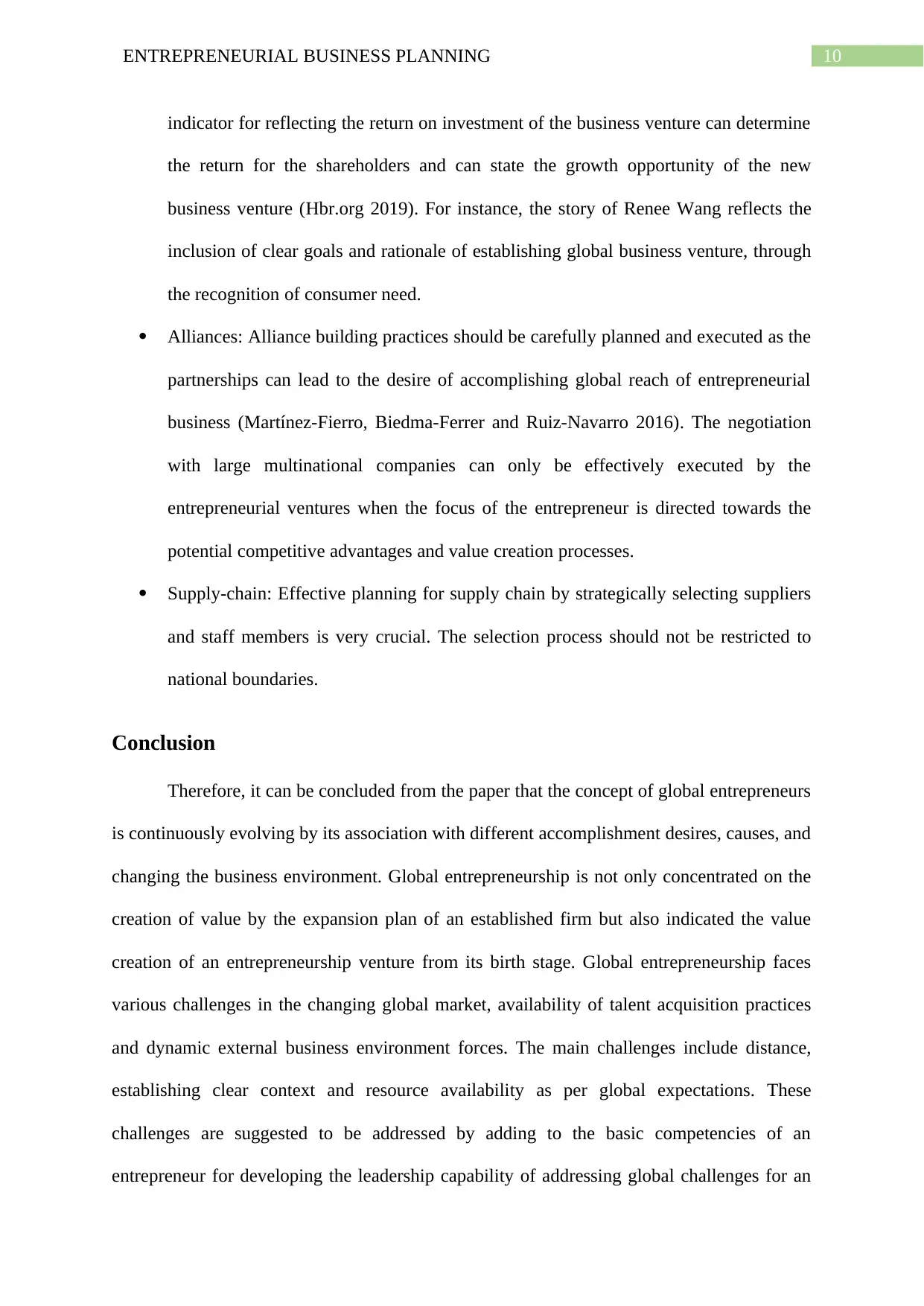
10ENTREPRENEURIAL BUSINESS PLANNING
indicator for reflecting the return on investment of the business venture can determine
the return for the shareholders and can state the growth opportunity of the new
business venture (Hbr.org 2019). For instance, the story of Renee Wang reflects the
inclusion of clear goals and rationale of establishing global business venture, through
the recognition of consumer need.
Alliances: Alliance building practices should be carefully planned and executed as the
partnerships can lead to the desire of accomplishing global reach of entrepreneurial
business (Martínez-Fierro, Biedma-Ferrer and Ruiz-Navarro 2016). The negotiation
with large multinational companies can only be effectively executed by the
entrepreneurial ventures when the focus of the entrepreneur is directed towards the
potential competitive advantages and value creation processes.
Supply-chain: Effective planning for supply chain by strategically selecting suppliers
and staff members is very crucial. The selection process should not be restricted to
national boundaries.
Conclusion
Therefore, it can be concluded from the paper that the concept of global entrepreneurs
is continuously evolving by its association with different accomplishment desires, causes, and
changing the business environment. Global entrepreneurship is not only concentrated on the
creation of value by the expansion plan of an established firm but also indicated the value
creation of an entrepreneurship venture from its birth stage. Global entrepreneurship faces
various challenges in the changing global market, availability of talent acquisition practices
and dynamic external business environment forces. The main challenges include distance,
establishing clear context and resource availability as per global expectations. These
challenges are suggested to be addressed by adding to the basic competencies of an
entrepreneur for developing the leadership capability of addressing global challenges for an
indicator for reflecting the return on investment of the business venture can determine
the return for the shareholders and can state the growth opportunity of the new
business venture (Hbr.org 2019). For instance, the story of Renee Wang reflects the
inclusion of clear goals and rationale of establishing global business venture, through
the recognition of consumer need.
Alliances: Alliance building practices should be carefully planned and executed as the
partnerships can lead to the desire of accomplishing global reach of entrepreneurial
business (Martínez-Fierro, Biedma-Ferrer and Ruiz-Navarro 2016). The negotiation
with large multinational companies can only be effectively executed by the
entrepreneurial ventures when the focus of the entrepreneur is directed towards the
potential competitive advantages and value creation processes.
Supply-chain: Effective planning for supply chain by strategically selecting suppliers
and staff members is very crucial. The selection process should not be restricted to
national boundaries.
Conclusion
Therefore, it can be concluded from the paper that the concept of global entrepreneurs
is continuously evolving by its association with different accomplishment desires, causes, and
changing the business environment. Global entrepreneurship is not only concentrated on the
creation of value by the expansion plan of an established firm but also indicated the value
creation of an entrepreneurship venture from its birth stage. Global entrepreneurship faces
various challenges in the changing global market, availability of talent acquisition practices
and dynamic external business environment forces. The main challenges include distance,
establishing clear context and resource availability as per global expectations. These
challenges are suggested to be addressed by adding to the basic competencies of an
entrepreneur for developing the leadership capability of addressing global challenges for an
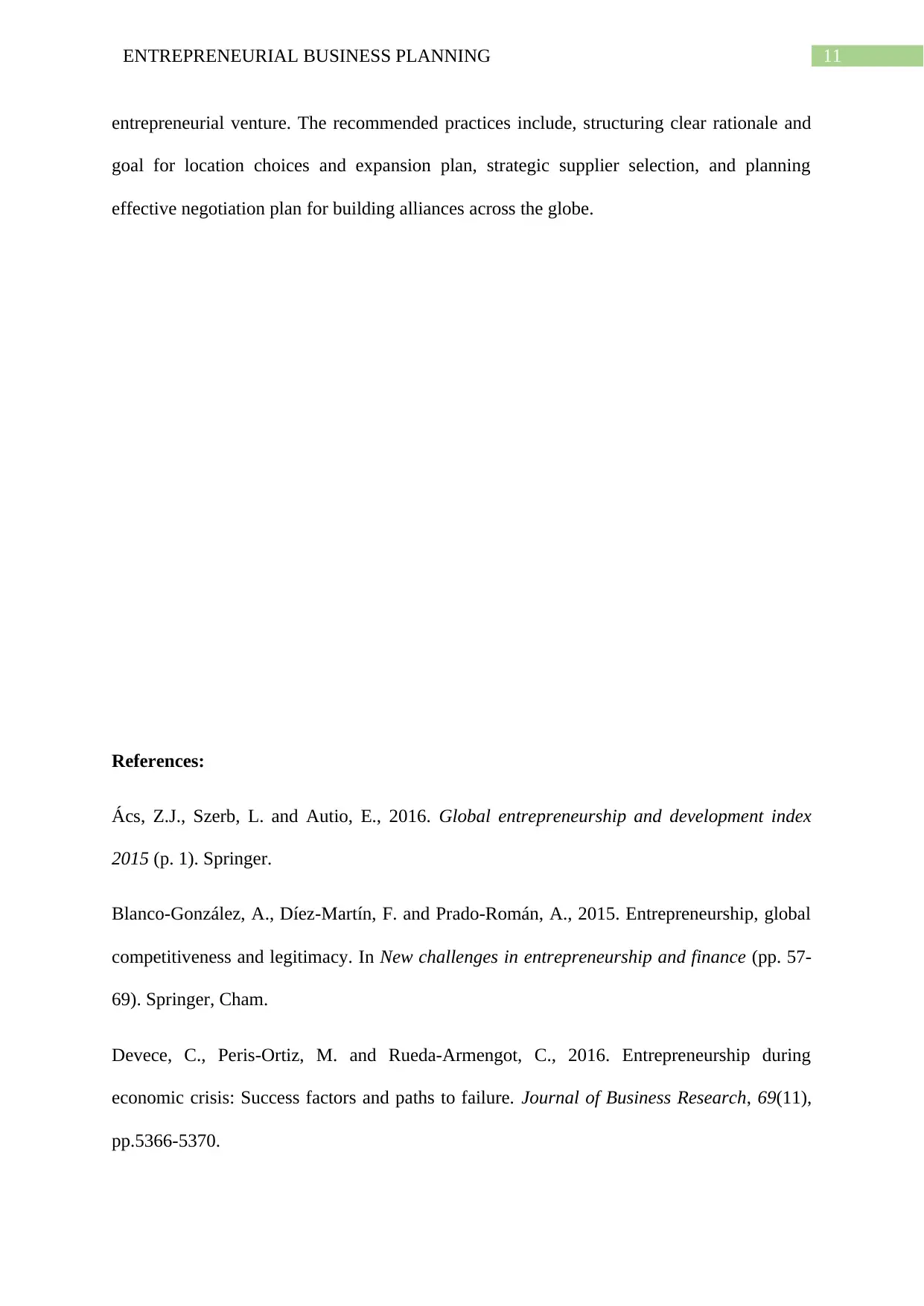
11ENTREPRENEURIAL BUSINESS PLANNING
entrepreneurial venture. The recommended practices include, structuring clear rationale and
goal for location choices and expansion plan, strategic supplier selection, and planning
effective negotiation plan for building alliances across the globe.
References:
Ács, Z.J., Szerb, L. and Autio, E., 2016. Global entrepreneurship and development index
2015 (p. 1). Springer.
Blanco-González, A., Díez-Martín, F. and Prado-Román, A., 2015. Entrepreneurship, global
competitiveness and legitimacy. In New challenges in entrepreneurship and finance (pp. 57-
69). Springer, Cham.
Devece, C., Peris-Ortiz, M. and Rueda-Armengot, C., 2016. Entrepreneurship during
economic crisis: Success factors and paths to failure. Journal of Business Research, 69(11),
pp.5366-5370.
entrepreneurial venture. The recommended practices include, structuring clear rationale and
goal for location choices and expansion plan, strategic supplier selection, and planning
effective negotiation plan for building alliances across the globe.
References:
Ács, Z.J., Szerb, L. and Autio, E., 2016. Global entrepreneurship and development index
2015 (p. 1). Springer.
Blanco-González, A., Díez-Martín, F. and Prado-Román, A., 2015. Entrepreneurship, global
competitiveness and legitimacy. In New challenges in entrepreneurship and finance (pp. 57-
69). Springer, Cham.
Devece, C., Peris-Ortiz, M. and Rueda-Armengot, C., 2016. Entrepreneurship during
economic crisis: Success factors and paths to failure. Journal of Business Research, 69(11),
pp.5366-5370.
⊘ This is a preview!⊘
Do you want full access?
Subscribe today to unlock all pages.

Trusted by 1+ million students worldwide
1 out of 13
Related Documents
Your All-in-One AI-Powered Toolkit for Academic Success.
+13062052269
info@desklib.com
Available 24*7 on WhatsApp / Email
![[object Object]](/_next/static/media/star-bottom.7253800d.svg)
Unlock your academic potential
Copyright © 2020–2026 A2Z Services. All Rights Reserved. Developed and managed by ZUCOL.





